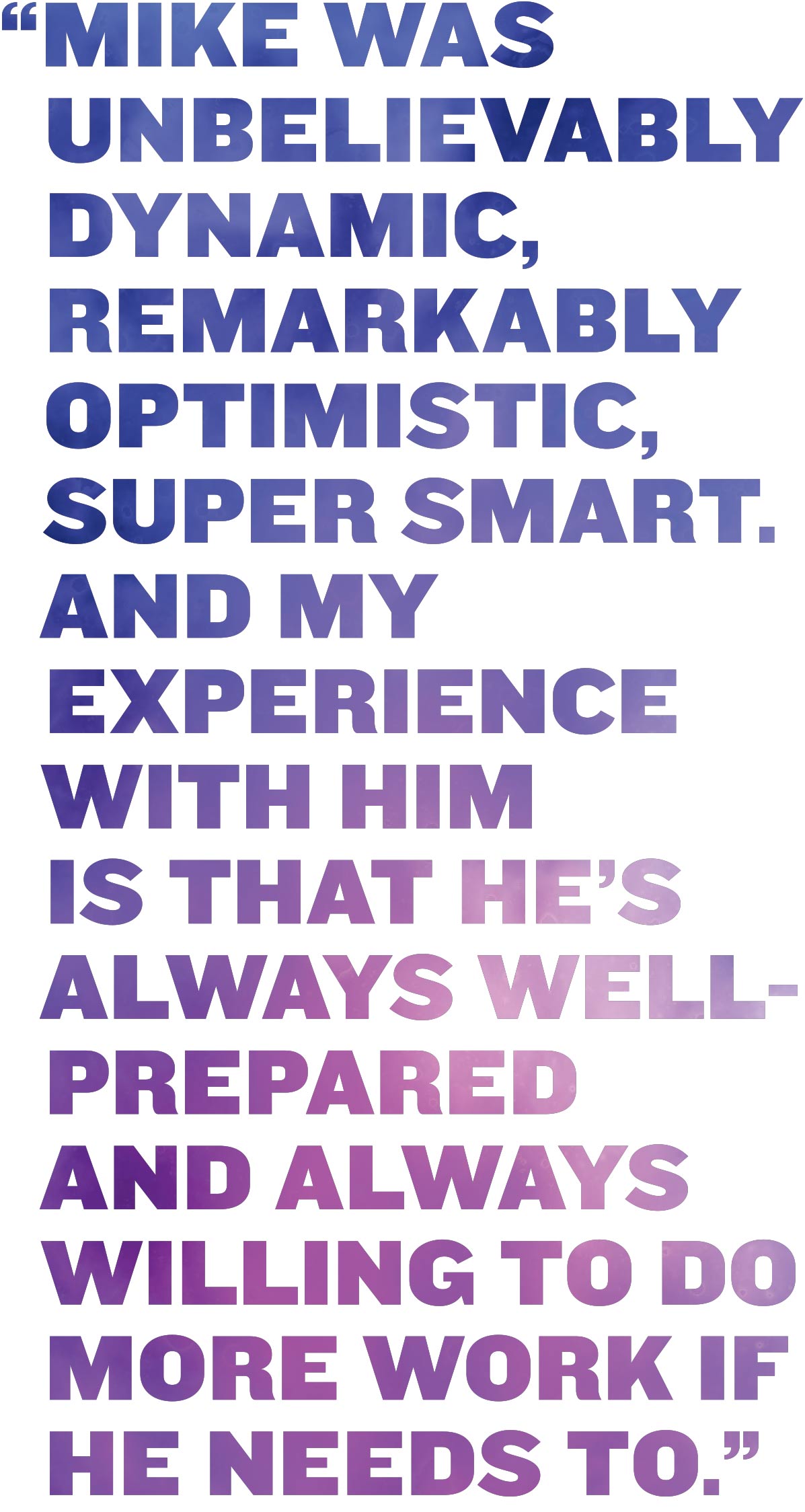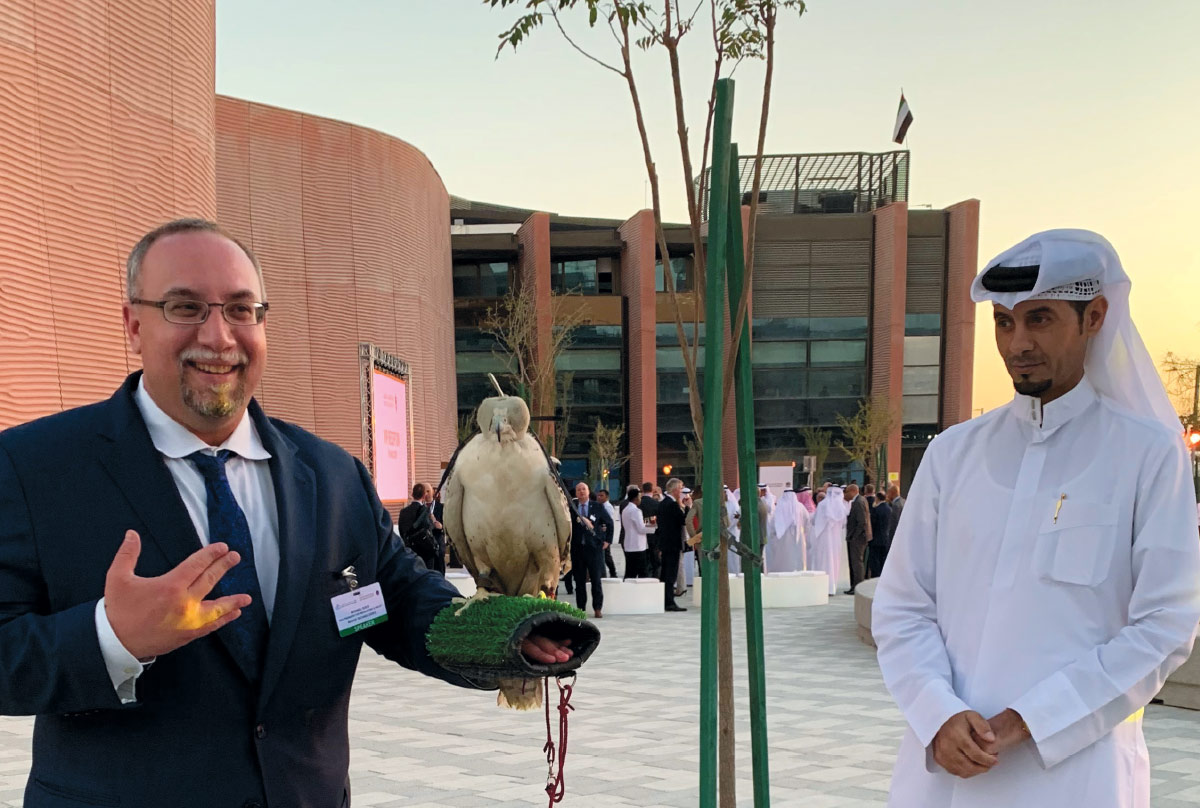
By Larry Teitelbaum


And that was his intergalactic ticket, a stairway, if not to heaven, then to his dream job at NASA, where he landed last year after years with commercial aerospace companies. “I wouldn’t have my career without my JD,” he said. “It has helped open up a number of doors to me … It was the way I got into aerospace.”
Gold is Acting Associate Administrator for NASA’s Office of International and Interagency Relations in Washington, DC, a job in which he serves as NASA’s top diplomat. He also provides strategic direction to the Office of General Counsel and supports commercial initiatives.
Gold envisions a golden era for space exploration. One where the Cold War recedes and where the space race resembles more of a relay than purely a global competition for solar system supremacy. He sees a wondrous expansion of human possibility with crewed missions to Mars. He visualizes leaps in quantum technology that will aid space travel and benefit society. And he believes in a world where, figuratively speaking, we turn swords into ploughshares … because he’s seen it.
A Star Trek devotee who comes in peace, Gold led the drafting of the Artemis Accords, a vehicle designed to prevent conflict and create harmony in space. The principles of the Artemis Accords were publicly announced in May. The Accords establish a new framework for international comity in space. The Artemis Accords set forth principles that govern how sovereign states and commercial companies operate in space and on the moon, creating so-called “safety zones,” a perimeter of sorts that keeps countries out of each other’s way. The pact also calls for transparent sharing of information.
The accords are timely as the US and mankind gears up for renewed missions to the moon and eventually to Mars. As a prelude, a demonstration launch on May 30 took an American crew to the International Space Station — which is celebrating its 20th anniversary of continuous operation — to test the safety of the capsule, the first built by a private company, SpaceX, founded by Tesla’s Elon Musk. It was the first launch from US soil in 9 years.
The goal is to put another man or woman on the moon by 2024, Gold said. Along the way, he said, astronauts must learn to acclimate to long periods in space because it will take at least 7 months to a year to reach Mars, as opposed to a week or so to go to the moon. According to Gold, astronauts will conduct future lunar operations while living aboard Gateway, which NASA describes as an “orbital outpost” and “staging point for deep space exploration.” Gateway will contain a science lab for research and ports for visiting spacecraft. (Gold’s former employer, Maxar Technologies, is building a component of the Gateway.)
Gold called the Gateway missions a “dress rehearsal” for Mars. “Mars is such an ambitious program that we need this step to gain experience with the biology and technology and all of the systems in order to mount that historic first human mission to Mars … Going to Mars is critical to make humanity a multi-planet species, to push forward the frontier of what’s possible. The scientific discoveries, the potential that awaits us in the solar system are unimaginable, and that all begins with Mars.”
Over the summer NASA deployed a new rover, named Perseverance, to prowl the Red Planet’s rocks and craters. Gold said he expects a crew to land on Mars, whose extreme weather he described as “worse than a summer in DC,” in the 2030s. “We hope to find signs of life in the soil and in the water ice … That would teach us a lot about who we are and the development of life on Earth.”
He grew up on an Indian reservation in Montana where his father was a soil scientist for the US Bureau of Indian Affairs. Years later Gold remembers the wonders of stargazing in such an unspoiled environment. “High definition” is how he describes Montana’s sky. “What you see when you look up in Montana is extraordinary, and it inspires an awe that has driven me my entire life.”
He also inherited his family’s rich tradition of space service. His mother, Florence, works as a contractor in her home region of Montana called High Schools United with NASA to Create Hardware (HUNCH), an extracurricular school program in which her students design and fabricate products used by the federal space agency. His grandfather, a self-taught engineer, tested the radio equipment that the Apollo astronauts used to communicate with mission control in Houston.
One of the first books he checked out of the library was an operation manual for the Columbia Space Shuttle. No surprise then that he became an ardent Star Trek fan in his youth. He remembers watching the show on a small black and white television. He found the show’s depiction of technology in the service of a peaceful future compelling.
Still, in Star Trek-speak, he needed a portal into the profession. His struggles with math and science precluded a career as a scientist. Enter Penn Law.
After his 1L year, Gold spent the summer working at NASA’s Langley Research Center in Virginia, which, among other things, develops technology for space exploration. He conducted research on a wide variety of space-related issues. During the latter part of his 1L year, he initiated an earthly project, serving as Co-Founder and Coordinating Editor of the Journal of Constitutional Law. Gold believed there should be a publication in the nation’s birthplace dedicated to the Constitution.

Former Dean of Students

Gary Clinton
Former Dean of Students
Former Dean of Students Gary Clinton, who helped Gold get the project off the ground, said a new student journal was a rare event. A new magazine, he said, required intellectual support from faculty and others, the promise of high-quality articles and an infusion of resources. Clinton pitched Dean Colin Diver because he thought the publication had promise and could succeed with Gold at the helm.
“Most students would be ‘whoa, too much work, I can’t do that,’” Clinton said. “But Mike, he would take things on … That was a big mountain to climb and he climbed it … Mike was unbelievably dynamic, remarkably optimistic, super smart. And my experience with him is that he’s always well-prepared and always willing to do more work if he needs to.”
Journal Co-Founder Kane Koo ENG’91, L’98, a contract attorney who does electronic discovery, still talks with Gold every week. Calling him a gifted manager who could work with a range of personalities, Koo said of Gold: “Mike is pretty good at seeing the big picture, the 10,000-foot view. You don’t really get the sense that he thinks he’s smarter than you, even though he might be.”
The Civil Practice Clinic also figured prominently in Gold’s law school experience. As he tells it, he memorably defended nuns who were running a halfway house for drug addicts that the City of Philadelphia wanted to shut down. He was nearly arrested when he and the nuns stood in front of the bulldozers and defied the city. “I said, ‘Look, you can bulldoze me and the nuns and everyone will watch that on television, or we can try to find a path forward that works for all of us,’” Gold recalled. The standoff yielded a compromise in which the authorities put a lock on the building to keep the residents in place but gave the nuns a key so they could continue their work, Gold said.
Bigelow aligned with Gold’s entrepreneurial instincts. Founded by Robert T. Bigelow, owner of the Budget Suites of America hotel chain, the company endeavored to join a budding initiative to have commercial enterprises, rather than the government, build spacecraft for NASA and create a new industry.
Gold founded the company’s Washington office. The company saw potential — and a large revenue stream — in the development of inflatable space stations, which could run nearly $400 million per year in rental fees for a six-person module, according to a story in The New York Times. In 2006 and 2007, Bigelow successfully launched, respectively, Genesis I and Genesis II, to test their durability. (The inflatable modules, made of material that is as hard as steel, are constructed to weather radiation in space and serve as human habitats on long journeys to the moon and Mars.)
During his 12 years with Bigelow, Gold In effect sent himself to Siberia, where he worked with Russians on a kind of DIY project: the launch of a prototype spacecraft. Bigelow’s Russian partners removed an old warhead from a nuclear missile and replaced it with a faring, a nose cone that is used to protect spacecraft during a launch through the atmosphere, Gold said.
“It was extraordinary for me as a child of the Cold War to, as an adult, be taking these weapons of war that we once feared and using them for peaceful space exploration,” Gold said.
Four years ago, Gold jumped from Bigelow to Maxar Technologies to oversee the aerospace company’s burgeoning US government business. He served as Vice President for Civil Space and as a liaison to NASA. That and his appointment to the NASA Advisory Council in 2018 put him on NASA’s radar.
Gold said he knew he had to work at the agency when NASA Administrator Jim Bridenstine accepted his invitation to speak at Awesome Con, the DC version of Comicon, a renowned annual gathering of science fiction and pop culture fans. “Neil Armstrong was the first man on the moon, but Jim Bridenstine was the first NASA administrator to address Comicon,” Gold joked.
Like Gold, Bridenstine sees Comicon as a source of engagement and potential recruiting ground for the next generation of NASA explorers, scientists, engineers, and mathematicians. Bridenstine, a Star Wars devotee, said he enthusiastically accepted the invitation from “probably the greatest Star Trek fan of all time” whom he described as “masterful at navigating the complexities that accompany legal and international work. He uses his charisma and genuine passion for space to bring people together.”
He continued, “Mike believes in the work we’re doing at NASA. There are very few people I’ve come across during my career that put as much effort into their job as Mike. He loves serving the country, and he knows that the objectives we are trying to achieve will not only improve the lives of Americans, but all of humanity.”
Gold’s portfolio at NASA keeps him busy. He said he consistently puts in 13- to 14-hour days. There is no end to the work which involves on a given day: collaborative discussions with other federal agencies and departments; exploring ways to bolster planetary defense to protect the Earth from asteroids; devising legal regimes for the exploration and use of space resources; and putting together, in his words, the most diverse coalition in the history of human spaceflight and, via the Artemis Accords, creating international norms for missions to the moon and Mars.
According to Gold, the expertise involved and the level of work that NASA undertakes is broad and challenging. “People focus a lot on the technical issues, and those are important and those are difficult, but I truly believe that it’s the political, the financial, the legal issues that are some of the most intransigent in the space world.”
Since the law threads through politics and finance, a law degree is critical, said Gold, explaining that space law is an amalgam of traditional areas of law such as contracts and international law. A legal background, he said, helps him navigate the web of government regulations that govern aerospace and NASA, as well as the mechanics of government contracting and procurement and the interaction of international treaties and domestic law.

The principle of Manifest Destiny thrives at NASA, which is driven to explore the frontiers of space and, in the modern era, adopt new technology. Gold foresees a quantum revolution: quantum computing, quantum encryption, and quantum sensors to further understanding of the environment in space. Innovation has always been core to NASA’s mission, said Gold, adding that the agency should continue to pursue SpaceX-like public-private-sector investments to bolster the US economy and to maintain American leadership in the final frontier.
Like Lewis and Clark, NASA has made, and will continue to make, a vast contribution to humanity’s storehouse of knowledge. Scientists previously thought the moon was bone dry, Gold said. But further exploration revealed vast amounts of frozen water in which hydrogen can be isolated and converted to rocket fuel. That act of discovery, and the concomitant sense of awe, should continue to fuel American pride in the space program, especially in hard times, he said.
“I think at a time when a virus is creating fear and separation that we answer with courage and perseverance,” said Gold, perhaps encapsulating NASA’s most important mission in the pandemic age. “NASA and space exploration have never been more relevant and more important to society than at this very moment.”
In the 1960s and 1970s, American astronauts became heroes. The whole nation gathered around television sets in school and at home to watch John Glenn orbit the Earth and to listen to Neil Armstrong’s immortal words: “One small step for man, one giant leap for mankind.”
NASA lifts spirits and powers national pride. For more than half a century, it has knit together a sometimes-riven country, standing as an enduring symbol of the country’s can-do ethos, a bright star in the American firmament. But Gold considers NASA’s glorious past a warm-up act for what’s to come for the legendary agency, for the American people and for the world.
“We’re literally just beginning,” Gold said. “We have far more ahead of us that will dwarf even the Agency’s past accomplishments.”